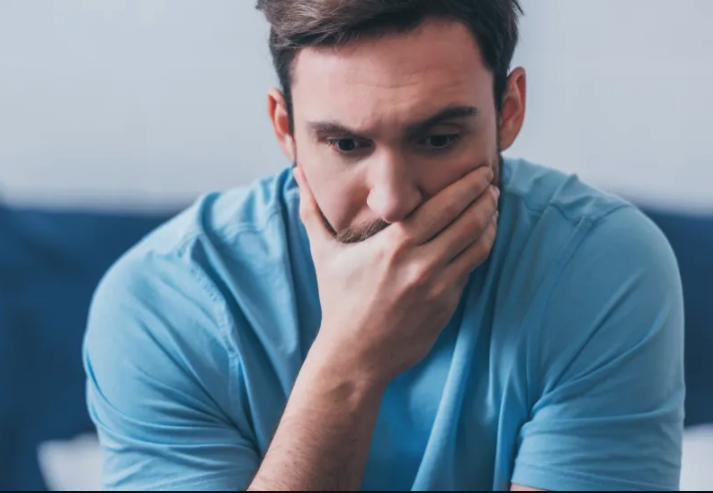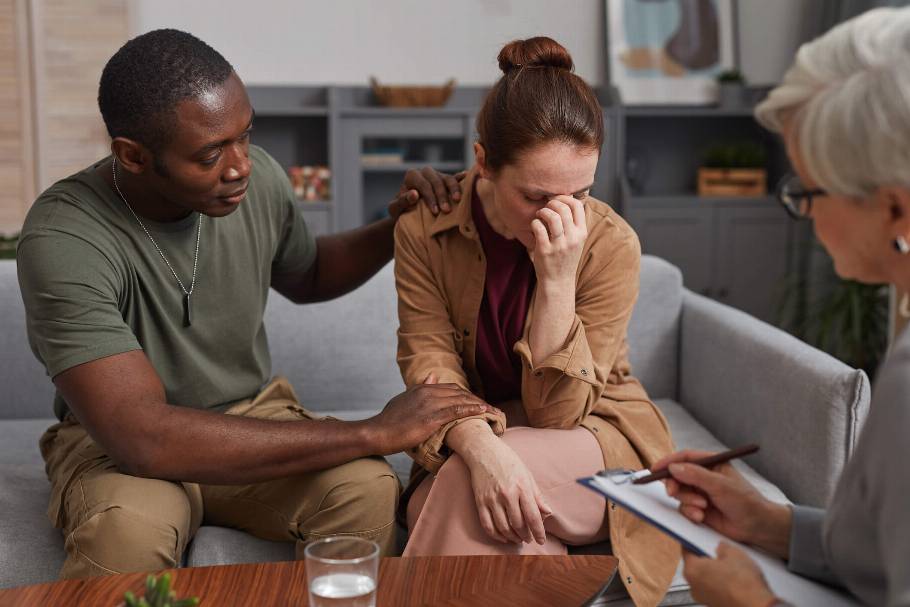Related (Ads):
Depression is no joke. If you think you might be having a bout of depression, talk to your healthcare professionals right away. Living with and fighting Depression can be tough. Its an ongoing journey and it’s best to be equipped with all the tools & support you need.

What is Depression?
Depression is a mental health disorder characterized by persistent feelings of sadness, hopelessness, and a lack of interest or pleasure in activities. It goes beyond the normal ups and downs that people experience in their daily lives. Depression can affect how a person thinks, feels, and manages daily activities.
Common symptoms of depression include:
- Persistent Sadness: Feeling sad, empty, or having a low mood that lasts for most of the day, nearly every day.
- Loss of Interest or Pleasure: Losing interest or pleasure in activities that were once enjoyable.
- Changes in Sleep Patterns: Insomnia (difficulty sleeping) or hypersomnia (excessive sleeping).
- Changes in Appetite or Weight: Significant changes in appetite or weight, either loss or gain.
- Fatigue or Loss of Energy: Feeling tired, lethargic, or having a lack of energy.
- Feelings of Worthlessness or Guilt: Feeling worthless or excessively guilty about things that may not be objectively significant.
- Difficulty Concentrating: Difficulty concentrating, making decisions, or experiencing memory issues.
- Restlessness or Agitation: Feeling restless or irritable.
- Physical Symptoms: Some people may experience physical symptoms such as headaches or digestive issues without a clear medical cause.
- Suicidal Thoughts: In severe cases, individuals with depression may have thoughts of death or suicide.
It’s important to note that depression is a medical condition, and it can affect anyone regardless of age, gender, or background. Various factors contribute to the development of depression, including genetic, biological, environmental, and psychological factors. Treatment options often include a combination of therapy, medication, and lifestyle changes. If you or someone you know is experiencing symptoms of depression, it’s crucial to seek help from a mental health professional.

Do Lots of People Have Depression?
Depression is a common mental health disorder, and it affects a significant number of people worldwide. According to the World Health Organization (WHO), more than 264 million people of all ages suffer from depression globally.
The prevalence of depression can vary across different populations, age groups, and regions. Factors such as socio-economic status, cultural influences, and access to mental health care can also impact the prevalence of depression. It’s important to recognize that depression is not limited to a specific demographic and can affect individuals from all walks of life.
While depression is widespread, it is often underdiagnosed and undertreated. Many people may not seek help due to stigma, lack of awareness, or barriers to accessing mental health services. Encouraging open conversations about mental health, reducing stigma, and improving access to mental health care are crucial steps in addressing and managing depression on a societal level. If you or someone you know is struggling with depression, seeking professional help is important for effective management and recovery.

Can You Have Depression & Not Even Know It?
Yes, it’s possible to have depression and not be fully aware of it. Some individuals may experience symptoms of depression but may not recognize them as signs of a mental health disorder. There are several reasons why someone might not realize they have depression:
- Gradual Onset: Depression can develop slowly over time, and individuals may adapt to the changes in their mood and behavior without realizing the extent of the impact.
- Normalization of Symptoms: People might dismiss their feelings of sadness, fatigue, or other symptoms as a normal part of life or attribute them to external stressors.
- Stigma and Denial: There is still a significant stigma associated with mental health issues, which can lead individuals to deny or downplay their symptoms due to fear of judgment or societal misconceptions.
- Lack of Awareness: Some individuals may not be familiar with the symptoms of depression or may not understand that what they are experiencing is a medical condition that requires attention.
- Physical Symptoms: Depression can manifest with physical symptoms such as headaches, digestive issues, or unexplained aches and pains, which may not immediately be recognized as related to mental health.
It’s crucial for individuals to pay attention to changes in their mood, behavior, and overall well-being. If someone is experiencing persistent feelings of sadness, loss of interest in activities, changes in sleep or appetite, or other symptoms associated with depression, seeking professional help from a mental health provider is important. Early recognition and intervention can significantly improve the outcomes for individuals dealing with depression.

What Are The Best Ways To Find Out If You Have Depression?
If you suspect that you may be experiencing depression, it’s important to consult with a mental health professional for a thorough evaluation. A licensed mental health provider, such as a psychologist, psychiatrist, or therapist, can help assess your symptoms, provide a diagnosis, and recommend an appropriate course of treatment. Here are steps you can take to find out if you have depression:
- Self-Reflection: Pay attention to your thoughts, feelings, and behaviors. If you notice persistent feelings of sadness, hopelessness, or a lack of interest in activities that used to bring you joy, it could be a sign of depression.
- Checklist of Symptoms: Review the common symptoms of depression, such as changes in sleep patterns, appetite, energy levels, concentration, and self-esteem. Keep in mind that everyone’s experience of depression can be different, and not everyone with depression will have all the symptoms.
- Consult a Mental Health Professional: Schedule an appointment with a mental health provider, such as a psychologist, psychiatrist, or therapist. They are trained to conduct assessments and diagnose mental health conditions, including depression. They may use interviews, questionnaires, and other assessment tools to gather information.
- Open Communication: Be open and honest about your thoughts and feelings during the assessment. Share any relevant information about your personal and family history, as well as any stressors or life changes that may be contributing to your symptoms.
- Physical Examination: In some cases, a healthcare provider may conduct a physical examination to rule out any potential medical conditions that could be contributing to your symptoms.
It’s important to note that self-diagnosis is not a substitute for a professional assessment. Mental health conditions can be complex, and accurate diagnosis requires a comprehensive evaluation by a qualified professional. If you are unsure whether you have depression, seeking guidance from a mental health provider is the best course of action. They can help determine an appropriate treatment plan based on your individual needs and circumstances.

Do You Have To Go To a Doctor or Therapist In Order to Treat Depression?
While consulting with a doctor or therapist is often recommended for the diagnosis and treatment of depression, there are various approaches to managing depression, and not everyone may require the same level or type of professional intervention. Here are some options:
- Self-Help Strategies: Some individuals with mild symptoms of depression may find relief through self-help strategies. These can include lifestyle changes such as regular exercise, maintaining a healthy diet, getting enough sleep, and engaging in activities that bring joy.
- Supportive Friends and Family: Emotional support from friends and family can be valuable. Talking to someone you trust about your feelings and experiences can provide comfort and understanding.
- Online Resources: There are many online resources, self-help books, and mental health apps that offer information, support, and tools for managing depression. However, it’s essential to ensure that the information comes from reputable sources.
- Counseling or Therapy: Professional therapy, such as counseling or psychotherapy, can be beneficial for individuals with depression. Therapists can help you explore and understand your thoughts and feelings, develop coping strategies, and provide emotional support. Therapists may include psychologists, social workers, counselors, or psychiatrists.
- Medication: In some cases, medication may be prescribed by a psychiatrist to help alleviate symptoms of depression. Antidepressant medications can be effective, especially for moderate to severe depression. It’s important to consult with a healthcare professional to determine the most appropriate medication and dosage.
- Combination of Approaches: Often, a combination of approaches is the most effective way to treat depression. This may include therapy, medication, and lifestyle changes.
It’s crucial to note that seeking professional help is advisable, especially if symptoms are severe, persistent, or impacting daily functioning. Depression is a medical condition, and professional guidance can significantly improve outcomes. If you are unsure about the best course of action, consulting with a healthcare provider or mental health professional can help you determine an appropriate treatment plan tailored to your specific needs.
Related (Ads):

What Are the Most Common Causes of Depression?
Depression is a complex mental health disorder, and its causes are often multifaceted, involving a combination of biological, psychological, and environmental factors. Here are some common contributors to the development of depression:
- Biological Factors:
- Genetics: A family history of depression may increase an individual’s susceptibility to the disorder. Certain genetic factors can play a role in predisposing someone to depression.
- Brain Chemistry: Imbalances in neurotransmitters, such as serotonin, norepinephrine, and dopamine, can influence mood and contribute to the development of depression.
- Psychological Factors:
- Personality Traits: Certain personality traits, such as a tendency to be self-critical, pessimistic, or prone to negative thinking, may contribute to the development of depression.
- Past Trauma: Experiencing traumatic events, such as abuse, loss, or other significant life stressors, can increase the risk of depression.
- Environmental Factors:
- Stressful Life Events: Major life changes, chronic stress, or ongoing difficulties in relationships, work, or financial situations can contribute to the onset of depression.
- Chronic Medical Conditions: Health problems or chronic illnesses can be associated with an increased risk of depression.
- Hormonal Factors:
- Hormonal Changes: Fluctuations in hormones, such as those occurring during puberty, pregnancy, or menopause, may contribute to depressive symptoms.
- Social and Cultural Factors:
- Isolation: Social isolation or a lack of supportive social connections can be a risk factor for depression.
- Cultural and Societal Expectations: Cultural or societal pressures and expectations can contribute to stress and increase the risk of depression.
- Substance Abuse:
- Drug or Alcohol Abuse: Substance abuse can be both a cause and a consequence of depression, as the use of substances may temporarily alleviate symptoms but can also worsen them in the long run.
It’s important to note that depression can result from a combination of these factors, and individual experiences vary. Additionally, not everyone with risk factors will develop depression, and conversely, some individuals without apparent risk factors may experience the disorder. If you or someone you know is experiencing symptoms of depression, seeking professional help is crucial for accurate diagnosis and appropriate treatment.

How Do Diet & Exercise Affect Depression?
Diet and exercise can have a significant impact on mental health, including depression. While they are not standalone treatments for moderate to severe depression, they can be valuable components of an overall treatment plan and contribute to improved mood and well-being. Here’s how diet and exercise can influence depression:
Exercise:
- Release of Neurotransmitters: Physical activity stimulates the release of neurotransmitters such as endorphins, which are often referred to as “feel-good” chemicals. These can contribute to an improved mood and reduced feelings of pain.
- Reduction of Inflammation: Regular exercise has been linked to a reduction in inflammation, which is thought to be involved in the development of depression.
- Improvement in Sleep: Exercise can help regulate sleep patterns, and adequate sleep is crucial for mental health. Lack of sleep or disrupted sleep can contribute to depressive symptoms.
- Stress Reduction: Exercise is known to reduce levels of stress hormones like cortisol. Chronic stress is a risk factor for depression, and exercise can help manage stress.
- Increased Self-Esteem: Achieving fitness goals through exercise can lead to an increased sense of accomplishment and self-esteem.
Diet:
- Nutrient Intake: A balanced and nutrient-rich diet provides the body and brain with essential vitamins and minerals, which are crucial for proper functioning. Nutrient deficiencies have been linked to an increased risk of depression.
- Omega-3 Fatty Acids: Foods rich in omega-3 fatty acids, such as fatty fish (e.g., salmon), flaxseeds, and walnuts, have been associated with a lower risk of depression.
- Probiotics: The gut-brain connection is an area of research interest, and a healthy gut microbiome, influenced by probiotics found in fermented foods like yogurt, may have positive effects on mental health.
- Blood Sugar Regulation: Maintaining stable blood sugar levels through a balanced diet can help prevent mood swings and fluctuations in energy levels.
- Hydration: Dehydration can contribute to feelings of fatigue and low energy, which are common symptoms of depression. Staying hydrated is essential for overall well-being.
It’s important to note that while diet and exercise can be beneficial, they should not replace professional treatment for depression. Individuals experiencing depression should consult with a healthcare provider or mental health professional to develop a comprehensive treatment plan tailored to their specific needs.

What About the Social Aspects of Depression? Can Being Lonely & Not Having Enough Friends & Family Around Affect My Depression?
Yes, social factors, including loneliness and a lack of social support, can significantly impact depression. Human beings are social creatures, and the quality of our social connections can have a profound effect on mental health. Here’s how social aspects can influence depression:
- Isolation and Loneliness: Social isolation and loneliness are risk factors for the development and exacerbation of depression. Feeling disconnected from others or lacking meaningful social interactions can contribute to a sense of emptiness and sadness.
- Social Support: Having a strong social support system can act as a protective factor against depression. Supportive relationships with friends and family provide emotional comfort, encouragement, and a sense of belonging.
- Stigma and Shame: The stigma associated with mental health issues can lead to feelings of shame and isolation. Individuals may be hesitant to share their struggles due to fear of judgment or misunderstanding, which can worsen depressive symptoms.
- Relationship Quality: The quality of relationships, both within the family and among friends, can influence mental well-being. Healthy, positive relationships contribute to a sense of security and happiness, while strained or toxic relationships can contribute to stress and depressive symptoms.
- Coping Mechanisms: Social interactions can serve as important coping mechanisms. Engaging in activities with friends and family, sharing experiences, and having a support system to rely on can help individuals navigate the challenges of life.
- Sense of Belonging: Feeling connected to a community or social group provides a sense of belonging and purpose, which can contribute to overall mental health. Conversely, a lack of belonging or feeling like an outsider can contribute to feelings of isolation and depression.
Addressing social aspects of depression may involve reaching out to friends or family, participating in social activities, joining support groups, or seeking professional help. Building and maintaining meaningful social connections can play a vital role in managing and preventing depression. If you are experiencing feelings of loneliness or isolation, it’s important to communicate with others and consider seeking support from friends, family, or mental health professionals.

What Are the Best Ways to Treat Depression Nowadays?
The treatment of depression often involves a combination of approaches, tailored to the individual’s specific needs and the severity of their symptoms. It’s important to consult with a mental health professional for an accurate diagnosis and personalized treatment plan. Here are some common and effective ways to treat depression:
- Psychotherapy (Counseling or Therapy):
- Cognitive-Behavioral Therapy (CBT): CBT is a widely used therapeutic approach that helps individuals identify and change negative thought patterns and behaviors associated with depression.
- Interpersonal Therapy (IPT): IPT focuses on improving interpersonal relationships and communication to alleviate depressive symptoms.
- Mindfulness-Based Therapies: Approaches such as Mindfulness-Based Cognitive Therapy (MBCT) or Mindfulness-Based Stress Reduction (MBSR) incorporate mindfulness and meditation techniques to help manage depressive symptoms.
- Medication:
- Antidepressants: Medications such as selective serotonin reuptake inhibitors (SSRIs), serotonin-norepinephrine reuptake inhibitors (SNRIs), and others can help regulate neurotransmitters in the brain to alleviate symptoms of depression. A psychiatrist typically prescribes these medications.
- Lifestyle Changes:
- Regular Exercise: Engaging in regular physical activity has been shown to have positive effects on mood and can help alleviate symptoms of depression.
- Healthy Diet: Eating a balanced and nutritious diet provides essential nutrients that support overall well-being, including mental health.
- Adequate Sleep: Establishing good sleep hygiene and ensuring sufficient, quality sleep is crucial for mental health.
- Social Support:
- Building and Maintaining Relationships: Cultivating positive and supportive relationships with friends and family can provide emotional support and reduce feelings of loneliness.
- Mind-Body Techniques:
- Yoga and Meditation: Mind-body practices like yoga and meditation can help manage stress and improve overall mental well-being.
- Deep Breathing Exercises: Practicing deep breathing and relaxation techniques can help calm the nervous system and reduce anxiety associated with depression.
- Support Groups:
- Joining Supportive Communities: Participating in support groups or community activities can provide a sense of connection and understanding.
- Professional Help:
- Psychiatric Evaluation: If medication is considered, a psychiatrist can conduct a thorough evaluation and prescribe appropriate medications.
- Regular Therapy Sessions: Regular attendance at therapy sessions is crucial for the effectiveness of psychotherapy.
- Mindfulness and Self-Compassion Practices:
- Mindfulness Meditation: Mindfulness practices can help individuals become more aware of their thoughts and emotions, fostering a non-judgmental and accepting attitude.
- Self-Compassion: Developing self-compassion involves treating oneself with kindness and understanding, which can be particularly beneficial for individuals with depression.
It’s important to note that not all treatments work the same for everyone, and what works for one person may not work for another. Individual preferences, the severity of symptoms, and other factors will influence the choice of treatment. Seeking professional guidance is crucial for developing an effective and personalized treatment plan. If you or someone you know is struggling with depression, reaching out to a mental health professional is an important first step toward recovery.

What About Prescription Medication? What Are the Best & Most Popular Ones for Treating Depression Nowadays?
The choice of medication for treating depression depends on various factors, including the specific symptoms, the severity of the depression, potential side effects, and individual response to medications. Different classes of antidepressants are available, and the effectiveness of a particular drug can vary from person to person. It’s important to note that only a qualified healthcare professional, typically a psychiatrist, can prescribe medication for depression after a thorough evaluation. Here are some common classes of antidepressants:
- Selective Serotonin Reuptake Inhibitors (SSRIs):
- Examples: Fluoxetine (Prozac), Sertraline (Zoloft), Paroxetine (Paxil), Escitalopram (Lexapro), Citalopram (Celexa).
- Mechanism: SSRIs increase the levels of serotonin in the brain, which is a neurotransmitter associated with mood regulation.
- Serotonin-Norepinephrine Reuptake Inhibitors (SNRIs):
- Examples: Venlafaxine (Effexor), Duloxetine (Cymbalta), Desvenlafaxine (Pristiq).
- Mechanism: SNRIs increase the levels of both serotonin and norepinephrine, affecting mood and emotional regulation.
- Tricyclic Antidepressants (TCAs):
- Examples: Amitriptyline, Nortriptyline, Imipramine, Desipramine.
- Mechanism: TCAs affect the reuptake of neurotransmitters like serotonin and norepinephrine. They are generally used less frequently due to their side effect profile.
- Monoamine Oxidase Inhibitors (MAOIs):
- Examples: Phenelzine (Nardil), Tranylcypromine (Parnate).
- Mechanism: MAOIs increase the levels of neurotransmitters by inhibiting the action of monoamine oxidase, an enzyme that breaks down these neurotransmitters. MAOIs are usually prescribed when other antidepressants are not effective due to their potential for serious interactions with certain foods and medications.
- Atypical Antidepressants:
- Examples: Bupropion (Wellbutrin), Mirtazapine (Remeron), Trazodone.
- Mechanism: Atypical antidepressants have diverse mechanisms of action. Bupropion, for example, primarily affects dopamine and norepinephrine.
The choice of antidepressant is individualized, and it may take some time to find the most effective medication and dosage. It’s important for individuals to communicate openly with their healthcare provider about their symptoms, concerns, and any side effects they may experience. Additionally, it’s crucial to follow the prescribed treatment plan, attend regular follow-up appointments, and report any changes in symptoms or side effects promptly.
It’s important to emphasize that medication is often used in conjunction with psychotherapy and lifestyle changes for a comprehensive approach to treating depression. The decision to use medication should be made in consultation with a qualified healthcare professional based on a thorough assessment of the individual’s specific situation.
Related (Ads):